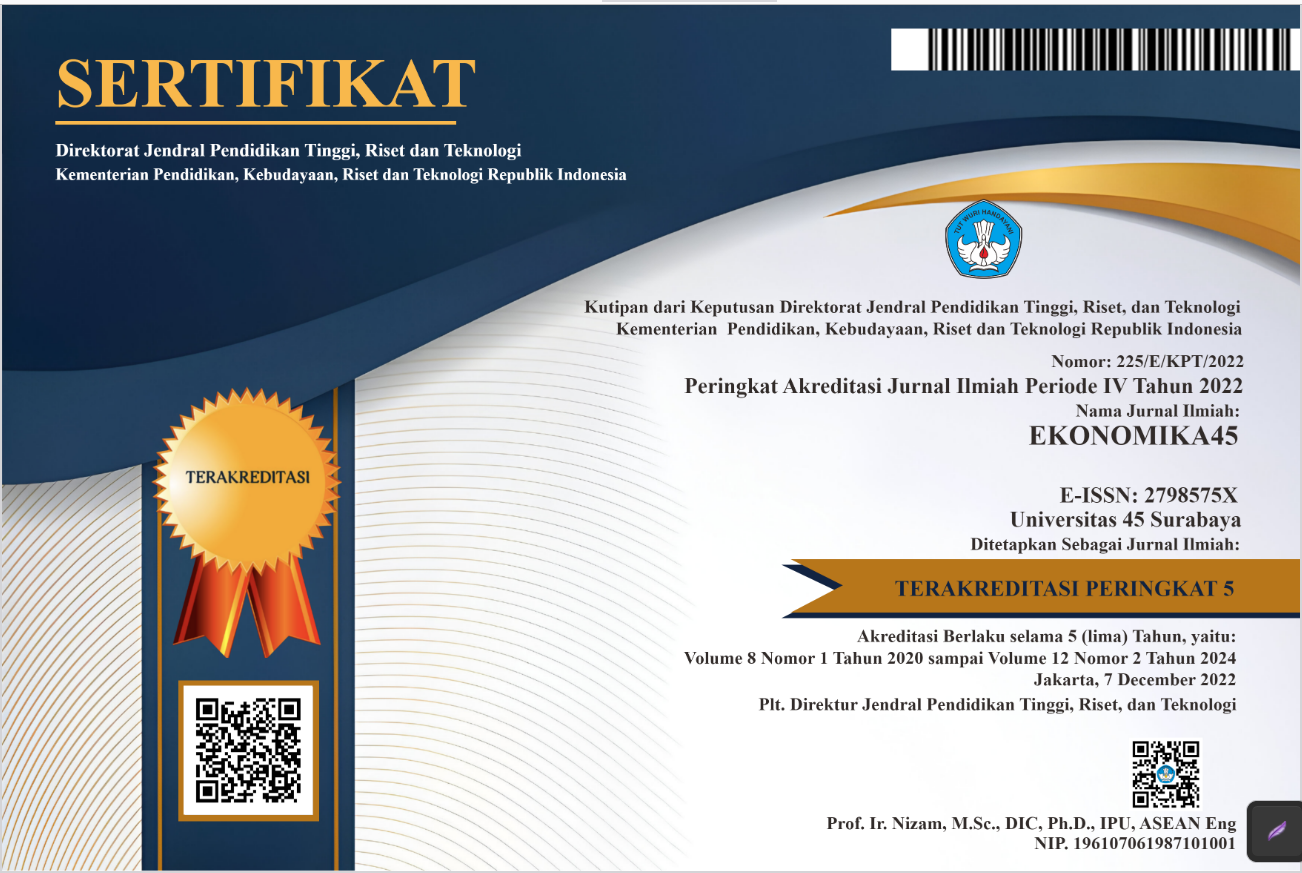Pengaruh Kemampuan Kerja dan Kemampuan Teknologi Informasi terhadap Kinerja Karyawan di Mediasi oleh Keseimbangan Kehidupan Kerja
(Studi kasus di PLN distribusi Jaringan Surabaya Barat)
DOI:
https://doi.org/10.30640/ekonomika45.v12i1.3653Keywords:
Work ability, IT Capability, Work life balance, Employee performanceAbstract
One thing that can improve employee performance is employee work-life balance, which is an individual's capability to carry out responsibilities in carrying out his personal and work life. This research investigates the influence of work ability and IT capability on work life balance. Also investigate whether Work life balance is a good mediator. This study conducted a survey of employees in the PLN West Surabaya distribution network. Using a purposive sampling method with sample criteria being employees who have worked for at least 1 year, 121 employees. The data was then analyzed using Structural Equation Modeling. The findings show that work ability and IT capability make a positive contribution to work life balance. Research also proves that work life balance mediates the relationship between work ability and IT capability on employee performance. This study contributes to understanding employee behavior by using the work life balance and employee performance framework in government companies, which can also be applied to other public companies.
References
Apulu, I., & Latham, A., (2011). Drivers for information and communication technology adoption: A case study of Nigerian small and medium sized enterprises. International Journal of Business and Management, 6(5), 51-60.
Arini, K. R., Mukzam, M. D., & Ruhana, I. (2015). Pengaruh kemampuan kerja dan motivasi kerja terhadap kinerja karyawan (studi pada karyawan PT Perkebunan Nusantara X (Pabrik Gula) Djombang Baru). Jurnal Administrasi Bisnis, 22(1).
Badrianto, Y., & Ekhsan, M. (2021). Pengaruh Work-life Balance terhadap Kinerja Karyawan yang di Mediasi Komitmen Organisasi. Jesya (Jurnal Ekonomi dan Ekonomi Syariah), 4(2), 951-962. DOI: 10.36778/jesya.v4i2.460
Bharata, A. (2023). Pengaruh Pemanfaatan Teknologi Informasi, Loyalitas, dan Work Life Balance Terhadap Kinerja Karyawan Aparatur Sipil Negara (ASN) Pada Masa Bekerja Dari Rumah Saat Pandemi Covid-19 Di Kementerian Pemberdayaan Perempuan dan Perlindungan Anak. Jurnal Simki Economic, 6(1), 71-79.
Blanchard, K. dan Hersey, P. (2013). Manajemen Perilaku Organisasi. Terjemahaan Agus Dharma, Penerbit Erlangga.
Dina. (2018). Pengaruh work-life balance terhadap kinerja karyawan di KUD Minatani Brondong Lamongan. Jurnal Indonesia Membangun, 17(2), 184–199.
Edison, Anwar, Komariyah (2017). Manajemen Sumber Daya Manusia, Bandung :Alfabeta
Efendi, K. R. N. (2022, August). Pengaruh Beban Kerja Terhadap Work Life Balance dan Implikasinya Terhadap Kinerja Karyawan. In Bandung Conference Series: Business and Management (Vol. 2, No. 2, pp. 1257-1260).
Hasibuan, M. S. (2020). Manajemen Sumber Daya Manusia Edisi Revisi. Jakarta : PT. Bumi Aksara.
Hudson. 2005. The Case for Work Life Balance. 20:20 Series. E-Book. The Case for Work/Life Balance : Closing the Gap Between Policy and Practic
Ismail, V. Y., & Sekarsari, M. (2022). Produktivitas Remote Working: Adaptasi Karyawan Terhadap Technostress Dan Work Life Balance. Fair Value: Jurnal Ilmiah Akuntansi dan Keuangan, 4(7), 1015-1025.
Kusumawati, R. E. (2021). Pengaruh Pemahaman Peraturan Pemerintah Tentang Dana Desa, Good Government Governance, Kualitas Sumber Daya Manusia, Teknologi Informasi Terhadap Kinerja Aparatur Pemerintah Desa (Studi Empiris Pada Desa Se-Kecamatan Ngadirejo Kabupaten Temanggung) (Doctoral dissertation, Skripsi, Universitas Muhammadiyah Magelang).
Kyriazos, T. A., & Stalikas, A. (2018). Applied Psychometrics: The Steps of Scale Development and Standardization Process. Psychology, 09(11): 2531–2560.
Lingga, A. S. (2020). Pengaruh Keseimbangan Kehidupan Kerja (Work Life Balance) dan Kepuasan Kerja Karyawan terhadap Kinerja Karyawan. Manajemen Bisnis, 6(2), 1134–1137.
Lockwood, N.R. (2003). Work-life balance: Challenges and solutions. Society for Human Resource Management Research Quarterly, Alexandria, VA.
Malhotra, N. K. and Birks, D. F. (2007). Marketing Research: an Applied Approach. 3rd Ed. Harlow: Pearson Education.
Mc Clelland, David. C. (1988). Human Motivation. New York : Cambridge University Press.
Moeheriono (2012). Pengukuran Kinerja Berbasis Kompetensi. Jakarta: Raja Grafindo Persada.
Nurhasanah, N., Jufrizen, J., & Tupti, Z. (2022). Pengaruh Etika Kerja, Budaya Organisasi Dan Beban Kerja Terhadap Kinerja Karyawan Dengan Kepuasan Kerja Sebagai Variabel Intervening. Jesya (Jurnal Ekonomi Dan Ekonomi Syariah), 5(1), 245-261.
Parkes, L. P., & Langford, P. H. (2008). Work–life balance or work–life alignment? A test of the importance of work-life balance for employee engagement and intention to stay in organisations. Journal of Management & Organization , 14 (3), 267–284.
Pratama, A. A. N., & Wardani, A. (2017). Pengaruh kemampuan kerja dan semangat kerja terhadap kinerja karyawan melalui kepuasan kerja (studi kasus Bank Syariah Mandiri Kantor Cabang Kendal). Jurnal Muqtasid, 8(2), 119-129.
Richardson, V.J., Subramani, M., & Zmud R.W. (2003). Benefiting from Information Technology Investments: the Role of IT Conversion Capability. Second Round Review at MIS Quarterly.Robbins, S.(2015), Perilaku Organisasi, Jakarta : Salemba Empat,.
Sekartini, N. L. (2016). Pengaruh kemampuan kerja, disiplin kerja, motivasi kerja terhadap kepuasan kerja dan kinerja karyawan administrasi universitas warmadewa. Jurnal Ekonomi dan Bisnis Jagaditha, 3(2), 64-75.
Sidik, A. R. (2019). Pengaruh kemampuan, work life balance, kepuasan kerja terhadap kinerja karyawan pada karyawan BMT Permata Jawa Timur. Yos Soedarso Economic Journal (YEJ), 1(1), 20-28.
Sidiq, A., & Astutik, E. P. (2017). Analisis Kapabilitas Teknologi Informasi Terhadap Kinerja Bisnis Ukm Dengan Orientasi Pelanggan Sebagai Variabel Intervening (Studi pada UKM Sektor Manufaktur di Wilayah Solo Raya). Media Ekonomi Dan Manajemen, 32(1).
Slovin, M.J. 1960. Sampling, Simon and Schuster Inc., New York.
Suprapti, U. (2024). Pengaruh Work From Home Dan Pemanfaatan Teknologi Informasi Terhadap Produktivitas Kerja Serta Dampaknya Pada Kinerja Penyuluh Pertanian Di Kabupaten Penukal Abab Lematang Ilir (Doctoral dissertation, 021008 Universitas Tridinanti Palembang).
Suryadi, Y., FoEh, J. E., & Manafe, H. (2022). Employee Productivity Determination: In Work Life Balance (WLB), Work From Home (WFH), Information Technology (IT) and Work Flexibility. Indonesian Interdisciplinary Journal of Sharia Economics (IIJSE), 5(2), 730-750.
Zhang, M., Sarker, S., & Sarker, S. (2008). Unpacking the effect of IT capability on the performance of export focused SMEs: a report from China. Information System Journal, 18(4), 357-380.
Zhu, Zhen., & Nakata, C. (2007). Reexamining The Link Between Customer Orientation And Business Performance: The Role Of Information Systems. Journal of Marketing Theory and Practice, 15(3), 187.
Downloads
Published
How to Cite
Issue
Section
License
Copyright (c) 2024 EKONOMIKA45 : Jurnal Ilmiah Manajemen, Ekonomi Bisnis, Kewirausahaan

This work is licensed under a Creative Commons Attribution-ShareAlike 4.0 International License.









